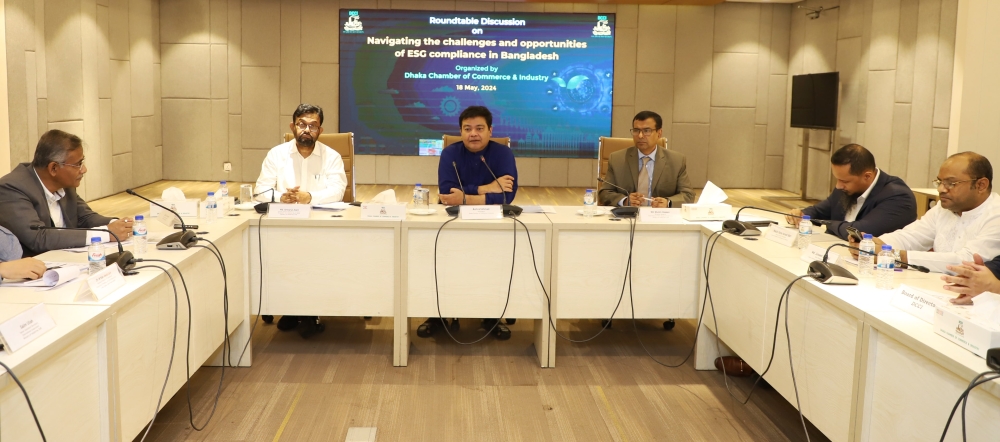News
Round Table Discussion on Navigating the Challenges and Opportunities of ESG compliance in Bangladesh

Embracing Environmental, Social and Corporate Governance (ESG) compliance framework will not only allow the businesses to align their values and strategies with sustainability objectives, foster economic growth but also remain competitive beyond LDC graduation. Absence of culture, Weak corporate governance and lack of data are few of the challenges to adopt ESG in Bangladeshi Industries, DCCI President Ashraf Ahmed told these in a round table discussion titled “Navigating the Challenges and Opportunities of ESG Compliance in Bangladesh” organized by Dhaka Chamber of Commerce & Industry (DCCI) on May 18, 2024.
DCCI President Ashraf Ahmed said as Bangladesh is being more connected to the world and country’s international trade is also increasing day by day, Environmental, Social and Corporate Governance (ESG) compliance is becoming mandatory for businesses. Investors consider ESG factors when assessing a business's potential since, it is a sign of resilience and long-term financial health.
It is worth mentioning that the trend of ESG reporting is going upward in Bangladesh. Organizations in different industries have started reporting on their ESG performance, and the government bodies have also taken initiatives to promote and encourage ESG reporting. Taking into account the importance of ESG compliance, he recommended for developing an effective ESG compliance strategies in alignment with the global value chain and integrating ESG considerations into decision-making processes and organization culture. He also underscored the need of educating the stakeholders including employees, management, investors, regulators and the mass public about the importance of ESG compliance and it’s reporting. Moreover, ESG compliance needs to be prioritized in embedding in other policies such as industrial policy, SME policy etc., he added.
Md. Munim Hassan, Director General, Department of Patent, Design & Trademarks, Ministry of Industries said that in every sector compliance is mandatory and compliance always increase the credibility of business. He said that for environmental or social compliance we individually should take responsibility on our shoulder. We should not look into what others do. He later informed that during 2016 to 2022 total 17 products of Bangladesh got GI whereas since 2023 to till date already 14 products have got GI certification and 30 more are in progress to get GI.
Md. Anwarul Alam, Director General (Additional Secretary), Bangladesh Accreditation Board (BAB), Ministry of Industries said Bangladesh Accreditation Board is directly linked with ESG. Bangladesh Accreditation Board works for ensuring quality of goods and services and BAB’s certification is accepted world-wide. He also urged all to be compliant and suggested the lab owners to get accredited from BAB. Environmental, Social and Corporate Governance (ESG) is also interlinked with the vision of Smart Bangladesh, he said.
The keynote speaker Zaku Uz Zaman, Country Representative, UNIDO, Bangladesh said the term "ESG" came into use in the early 2000s, but its foundations were laid in the 1990s. ESG works as an evaluation of a firm's seriousness in engaging with environmental, social and governance factors. Investors are now a days interested progressively focused on how a company influences the society. He also said that there is no defined format for ESG reporting that makes challenging for the management to understand what is required to be reported. Compliance with ESG reporting can help Bangladeshi companies to be competitive after graduation from LDC.
Dr. M Niaz Asadullah, Visiting Professor of Economics, University of Reading, UK, Mohammad Bin Quasem, Director, Echotex Ltd., Yeasmin Akther, Business Manager, Knowledge, Health and Nutrition, SGS Bangladesh Limited, M Abu Horairah, former Vice President, DCCI, Enamul Haque Patwary, former Director, DCCI, Rashid Shah Shamrat, former Director, DCCI also spoke on the occasion. Speakers while speaking stressed for an ESG policy, creating awareness, having monitoring and reporting system. They also suggested orienting people about what ESG is. For the sake of environmental safety they put emphasis on massive afforestation across the country. They also urged for a concerted efforts as well as implementation of rules and regulations to implement ESG in the country.
Published on: 2024-05-18
